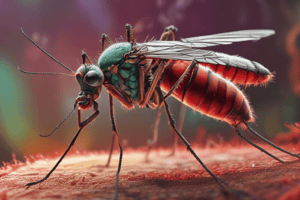Podcast
Questions and Answers
What is the primary mechanism through which natural passive immunity occurs?
What is the primary mechanism through which natural passive immunity occurs?
- Development of antibodies by the infant
- Production of antibodies in the placenta
- Injection of antibodies from another organism
- Transfer of antibodies from mother to offspring (correct)
Which antibody is known to cross the placenta in significant amounts?
Which antibody is known to cross the placenta in significant amounts?
- IgD
- IgA
- IgM
- IgG (correct)
What factor does NOT influence the level of IgG crossing the placenta?
What factor does NOT influence the level of IgG crossing the placenta?
- IgG concentration in the mother’s blood
- Gestational age of the fetus
- Infant's diet after birth (correct)
- Integrity of the placenta
How long do maternal antibodies typically provide protection to the baby?
How long do maternal antibodies typically provide protection to the baby?
What defines artificial passive immunity?
What defines artificial passive immunity?
Which type of immunity is primarily provided to newborns through breast milk?
Which type of immunity is primarily provided to newborns through breast milk?
What is the significance of IgG levels decreasing in the infant during the first months of life?
What is the significance of IgG levels decreasing in the infant during the first months of life?
Which of the following statements about IgA and IgM in breast milk is correct?
Which of the following statements about IgA and IgM in breast milk is correct?
What type of antibodies are predominantly produced during a primary immune response?
What type of antibodies are predominantly produced during a primary immune response?
How do lymphocytes maximize their chance of encountering an antigen after an initial exposure?
How do lymphocytes maximize their chance of encountering an antigen after an initial exposure?
During the secondary immune response, which type of antibodies are predominantly produced?
During the secondary immune response, which type of antibodies are predominantly produced?
What is the primary immune response characterized by?
What is the primary immune response characterized by?
What is the function of memory lymphocytes formed during the primary immune response?
What is the function of memory lymphocytes formed during the primary immune response?
What type of immunity is acquired through the transfer of antibodies from one individual to another?
What type of immunity is acquired through the transfer of antibodies from one individual to another?
Why is the secondary immune response stronger than the primary immune response?
Why is the secondary immune response stronger than the primary immune response?
How often do lymphocytes move between lymphoid tissues and the bloodstream?
How often do lymphocytes move between lymphoid tissues and the bloodstream?
Study Notes
Immune Response Overview
- The secondary antibody response is more robust than the primary response.
- Experiments demonstrate this difference, particularly in patients infected with the dengue virus.
- Patients' antibody levels varied based on whether it was their first or secondary exposure to the virus.
Primary Immune Response
- Occurs upon the initial encounter of T or B lymphocytes with a specific antigen.
- Characterized by the production of IgM antibodies as the predominant type.
- After initial exposure, B and T memory lymphocytes are formed, circulating between lymphoid tissues and blood.
- Lymphocytes can move between blood and lymphoid tissues approximately 50 times daily, enhancing the likelihood of antigen recognition.
Secondary Immune Response
- Arises after subsequent encounters with the same antigen, resulting in a faster immune reaction.
- Memory lymphocytes allow for a quicker proliferation of necessary antibodies.
- IgG antibodies dominate the secondary response compared to IgM in the primary response.
Passive Immunity
- Passive immunity involves the transfer of antibodies from one organism to another and is generally short-lived compared to active immunity.
- Naturally occurs when maternal antibodies pass through the placenta before birth or through breast milk after birth.
- Provides crucial early-life protection to the infant while their immune system matures.
Maternal Antibody Transfer
- IgG is the only antibody class that significantly crosses the placenta.
- Factors influencing IgG transfer include maternal blood concentration, fetal gestational age, placenta integrity, and antigen characteristics.
- Maternal IgG concentrations decrease over the infant's first nine months, while breast milk continues to provide antibodies.
Artificial Passive Immunity
- Artificial passive immunity involves administering antibodies produced by a different organism (e.g., horse or rabbit) to an individual.
- An example includes the provision of IgG antibodies to mothers with Rh-incompatible babies.
Antibody Levels in Breast Milk
- IgG levels in breast milk approach concentrations found in maternal blood, while IgA and IgM levels are lower at about half the concentration.
- Breast milk continues to supply antibodies to the infant, aiding immunity during early development.
Studying That Suits You
Use AI to generate personalized quizzes and flashcards to suit your learning preferences.
Description
This quiz explores the differences between primary and secondary antibody responses to dengue virus infection. Based on experimental data, it examines how patients' antibody levels vary depending on their exposure to the virus. Test your understanding of the immune response in dengue infections.




